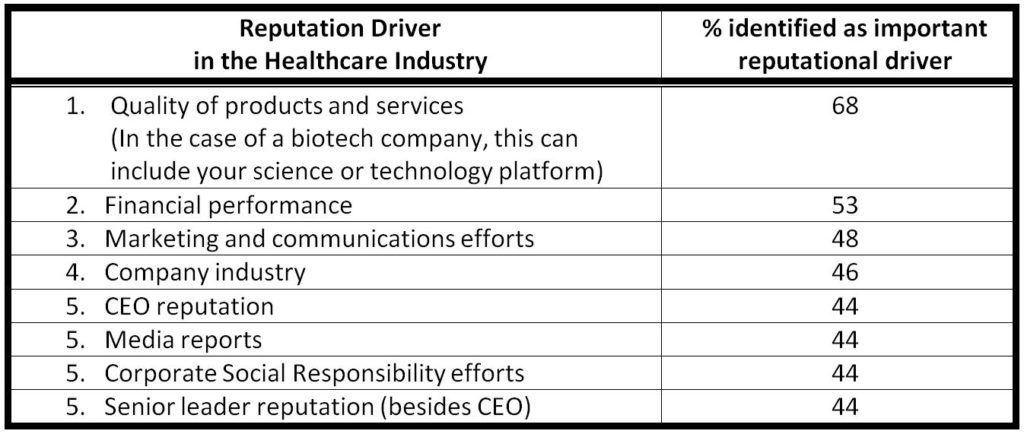This blog was co-written by Deanna Petersen, Chief Business Officer of AVROBIO, and Paul Newman, head of Corporate Communications, as part of the From The Trenches feature of LifeSciVC.
“It takes twenty years to build a reputation, and five minutes to ruin it,” Warren Buffett said, and added “If you think about that, you’ll do things differently.” In biotech, a strong reputation is difficult to build, is even harder to establish quickly, and can be easily tarnished. So, what’s the landscape and what should we do about it?
 Reputation has always been significant. Today, reputation is increasingly important because trust in institutions and companies is being eroded in the U.S. and around the world.
Reputation has always been significant. Today, reputation is increasingly important because trust in institutions and companies is being eroded in the U.S. and around the world.
On top of the general rise in emphasis on company reputation, the building and management of reputation is especially challenging for biotech companies because:
- Volatility is par for the course in the biotech industry.
- Uncertain success and failure are necessary attributes of an industry that pushes the frontiers of knowledge and scientific understanding, like we do. “Does it work, and if so, how does it work” are often the most common questions from patients, their families, and patient advocacy groups.
- In a fast-moving sector, biotech businesses typically move with incredible speed.
- Breakthrough single-dose treatments with curative potential create new messaging challenges.
- Broader societal issues are an expectation for companies to adopt by today’s employees and other important stakeholder groups.
- The rise of social media has amplified the prevalence of widely distributed, alternative, yet often unsubstantiated, points of view. Trust relies on a leap of faith, but apparent contradictory evidence on social media can result in entrenched distrust.
- Over-promising and under-delivering by less reputable biotech companies in the past has resulted in an element of residual skepticism.
We all know what reputation is. The Merriam-Webster Dictionary defines reputation as: overall quality or character as seen or judged by people in general; or a place in public esteem or regard and good name.
We also know that everyone has a reputation. All companies and organizations (and CEOs and executives) have a reputation, whether good, bad or indifferent. So, it makes sense to allocate resources and expertise to proactively manage and improve an organization’s reputation. At AVROBIO, for example, we developed a strategic communications plan early in our history that includes an overarching focus on corporate reputation, and we partner with a select number of outside experts who bring complementary expertise to guide our corporate reputation among key stakeholders, including patient advocates, regulators, investors, media, pharmaceutical leaders, clinicians, and potential new employees.
What are the benefits of a stronger reputation?
At the same time as reputation is difficult to build, it’s becoming ever-more important.
The corporate benefits of a strong reputation Include: better business development and partnership opportunities; perception of delivering high quality products and services; improved relationships with suppliers; a higher and more robust stock price; more satisfied and motivated employees and increased staff retention; better qualified job applicants; and – in difficult times – more understanding from external organizations of the company’s position when dealing with issues management and crisis situations.
As Professor Charles Fombrun (an academic renowned for his pioneering work and formerly research professor of management at NYU’s Stern School of Business) notes: “A reputation develops from a company’s uniqueness and from identity-shaping practices, maintained over time, that lead stakeholders to perceive the company as credible, reliable, responsible and trustworthy. Best regarded companies … adhere rigorously to practices that consistently and reliably produce decisions that the rest of us approve of and respect. By increasing our faith and confidence in the company’s actions, credibility and reliability create economic value.” 1
What are the most important factors in shaping corporate reputation?
Global PR agency Weber Shandwick conducted online research with more than 1700 executives worldwide in 2015. The summary was that “corporate reputation is strong yet vulnerable, with new x-factors.” For all business sectors the main factors were:
“Company reputations are shaped by a number of factors, with quality of products and services identified as the most important factor by 66% of global executives, followed by financial performance (57%). Leadership reputation falls among the top drivers (49%). Importantly, a company’s industry ranks as the fourth most important driver of corporate reputation (50%) and… clearly the reputational impact of an industry today ripples beyond a single company. For executives responsible for managing reputation, the adage about being ‘tarred with the same brush” rings true.” 2
In the healthcare industry, the top eight drivers of company reputation, from that same research, were:
What’s sometimes overlooked?
In recent years, there’s been a fundamental change in the flow of information in the health care industry, including the pharma and biotech sectors, from a straightforward top-down, traditional model to more open, multi-directional dialogues across the healthcare ecosystem including payers and regulators, developers and researchers, and others. This trend and the changing expectations of various stakeholders – from patients and their families, to employees, investors and analysts, advocacy groups, influencers, media, partners, and regulators – have made the management of a company’s reputation more complex.
Consumers, or patients, represent the most important stakeholder group when it comes to judging the strength of reputations and corporate brands, and this is particularly relevant for any drug developer as the patient voice is more significant than ever. Though it’s perhaps evident, it’s worth reminding ourselves that patients have the most at stake regarding new medicines. And in the health/pharma sector, government and policymakers scored far higher than in all other business sectors.
Are we giving enough consideration to our relationships and reputation with key stakeholders, and are we thoroughly allocating resources in the right areas? Here are six factors that can help assess your corporate reputation strategy and focus, based on my experience:
- Patient focus: Keeping patients and their families as a central purpose of a biotech company has a massive impact on the company’s culture, and reputation. For example, at AVROBIO our purpose revolves around patient focus, as expressed through our tagline “Freedom from a lifetime of disease.”
- Employee communications: Understanding the essential role of employees as ambassadors and harnessing their involvement is often a missed opportunity. Employees are a living example of a company’s reputation.
- Third-party credibility: Third party (independent and disinterested) opinions are often more trusted – and powerful – than an organization’s own point of view. A biotech company’s reputation is reflected in what’s said about the company by its range of stakeholders, from investors and biotech peers, to patients and clinicians, to regulators and the media.
- Keep it simple: Clarifying your biotech company’s science story and corporate messaging can work wonders in ultimately building stronger relationships with influencers, stakeholders and audiences, ultimately leading to strengthening your reputation.
- Work with experts: Don’t be afraid to hire or work with reputation management and public relations leaders, rather than have your reputation program get stuck on the back burner. A strong reputation is a significant competitive advantage.
Intangible value is real.
Reputation, along with other intangible assets, has a real and growing value. That’s a key reason why it’s more important than ever for biotech companies. Back in 1984, the book value of the top 150 U.S. public companies (what their physical assets could be sold for) made up 75% of their stock market value, according to a paper by economists Robert J. Shapiro and Nam Pham. By 2005, only 19 years later, the book value of the top 150 companies had dropped by 39% – to just 36% of their market value. The remaining two thirds of value laid in their intangible value. 3
Even more recently, the accounting firm Ernst & Young reported that intangible assets average 52% of an organization’s market value, and in some cases as much as 90%.4 A significant part of these intangible assets is a strong corporate reputation. Focus on reputation is not a nice-to-do; it’s a must-have.
AVROBIO’s Chairman, Bruce Booth, is a strong advocate of focusing on these intangible elements. He recently observed that biotech is “an event-driven business where data read-outs can have dramatic effects … [yet] sentiment changes, even in the absence of data, can move stocks.”
“Let people know you’re doing the right thing.”
Having started with Warren Buffett, I’ll give the last word to John D. Rockefeller: “Next to doing the right thing, the most important thing is to let people know you’re doing the right thing.”
Your company’s reputation, a combination of what you do and how you communicate about it to your stakeholders, now deserves extra attention more than ever before.
Notes:
- Charles Fombrun: Realizing value from the Corporate Image. Harvard Business School Press, 1996
- Weber Shandwick: The CEO Reputation Premium, 2015
- Smart Company: The increasing importance of intangible assets, 2103
- EY Center for Board Matters: Top Priorities for Boards in 2019, 2018.






